Table of Contents
When considering Squier guitars, it’s crucial to assess their quality and performance. With a focus on reliability and sound, they have garnered significant attention in the music community.
This evaluation asks the question, are Squier guitars good? Do they meet the standards expected by musicians?
The first aspect to examine is the overall construction of Squier guitars. With attention to detail and craftsmanship, these instruments offer remarkable durability and stability.
Additionally, Squier Guitars provide exceptional playability, allowing musicians to effortlessly explore their creativity. Moreover, their resonant tonal characteristics enable players to achieve a satisfying and authentic sound.
They are also preferred by beginners due to their affordability without compromising on quality. These guitars provide an excellent entry point for new guitarists without breaking the bank.
Many professionals also choose Squier guitars as backups, as they reliably deliver consistent performance.
In this Killer Rig, we are going to get into the strings and frets, the wood and the wires, the rhythm and the resonance of these guitars. Let’s get to the heart of the matter, dissecting each aspect to ultimately answer the question, are Squier guitars good?
Key Takeaways
- Squier Guitars provide a good option for beginner and intermediate players. With their affordable price range and decent quality, they are a great choice for those who are just starting out or looking for a budget-friendly option. They offer good playability and solid sound, making them suitable for learning and practicing.
- Squier Guitars are owned by Fender Musical Instruments Corporation, a well-known and respected name in the industry. This association ensures that Squier Guitars maintain certain standards of quality and craftsmanship.
- Squier Guitars offers many different models and series that cover a multitude of musical genres. They are typically body shapes that many players recognize as Fender style guitars.
History of Squier
Squier Guitars has a rich and storied past that dates back several decades. Born out of its close connection to the iconic Fender brand, Squier has established itself as a reputable name in the guitar industry.
In the early years, Squier guitars were manufactured in Japan and were known for their exceptional craftsmanship.
These instruments quickly caught the attention of musicians worldwide and found their way into the hands of renowned artists. Squier’s guitars became synonymous with reliability, playability, and an authentic sound that rivaled higher-priced options.
Wider Distribution and Expansion
As demand for Squier guitars grew exponentially, Fender took notice and realized the potential of this subsidiary brand.
With meticulous attention to detail and unwavering commitment to quality, Fender expanded production beyond Japan to other locations such as Korea, Indonesia, China, and Mexico.
This move allowed Squier guitars to reach a wider audience while maintaining the standards it had become known for.
Innovation and Evolution
Over time, Squier continued to innovate and evolve its product line-up. With advancements in technology and design, Squier guitars incorporated features that catered to different musical styles and player preferences.
From classic designs reminiscent of vintage instruments to modern variations with cutting-edge additions, Squier offered something for every guitarist.
Today, Squier remains a respected brand in the guitar community. Its extensive range of instruments continues to provide accessibility for aspiring musicians without sacrificing performance or craftsmanship.
With its deep-rooted history within Fender’s legacy, Squiers have become sought-after by experienced players seeking reliable instruments at an affordable price point.
Are Squier Guitars Good?
Squier guitars are known for their good quality and durability. They have been manufactured by Fender, ensuring high standards and attention to detail.
They are popular among both beginner and professional musicians due to their affordable price range and rigidity.
Many well-known artists have also endorsed Squier guitars, further establishing their reputation for quality. The combination of affordability, reliability, and endorsement from professionals makes Squier guitars a trusted choice for musicians at all levels.
I own a Squier Affinity Series Stratocaster and absolutely love it. When I bought the guitar, it came with nearly perfect action and played great right out of the box.
The finish is very nice and for the price, the hardware is pretty decent. I, too, can confirm that Squier is a good guitar brand!
Related: Where are Squier guitars made?

What are Squier Guitars Good For?
When it comes to technique and musical style, Squier guitars are no slouch. They’ve been the go-to choice for many due to their versatility and prowess in various domains.
1. Rock and Punk: With a robust build and a sound that can deliver punchy tones, Squier guitars are tailor-made for rock and punk genres. Whether you’re power chording through a punk anthem or laying down a classic rock riff, the Squier’s pickups capture the essence brilliantly.
2. Blues and Jazz: The smooth neck of many Squier models, especially those in the Stratocaster family, is perfect for the bending and sliding that blues and jazz demand. The tonal warmth these guitars can produce makes them a favorite among blues guitarists.
3. Fingerstyle and Acoustic Techniques: While primarily known for their electric models, Squier’s acoustic range is commendable. Their acoustics resonate well with fingerstyle techniques, producing a clear and melodious sound.
4. Lead Techniques: For those who love to solo, the Squier’s fret accessibility and playability make it a joy to navigate. From tapping to sweep picking, these guitars can handle intricate lead techniques with ease.
5. Customization and Experimentation: Beyond standard playing, Squier guitars are a playground for those looking to experiment. Their mod-friendly nature means guitarists can tweak them to suit specific styles or sounds, making them a favorite among tinkerers.
You’ll also see a lot of indie and alternative musicians using Squier guitars. If you’re trying to stand out from the crowd, then the sound and classic look will get you there.
A Squier guitar can do the job whether you’re strumming in your garage, recording in a studio, or performing live. They can withstand the road, sound fantastic, and are dependable.
What Is The Difference Between Fender And Squier?
Fender and Squier, while both guitar brands, have some differences. The main contrasts are summarized in the table below. If you want to learn more, read my article Fender vs Squier for a deep dive into the subject.
| Brand | Characteristics |
|---|---|
| Fender | Known for high-quality craftsmanship and premium price range Made in the USA Superior pickups and hardware |
| Squier | Offers more budget-friendly options Manufactured overseas Authorized by Fender with high standards of quality control |
One detail worth noting is that despite being a subsidiary brand, Squier guitars are authorized by Fender and maintain their high standards of quality control.
The Squier Guitar Range
Squier offers a variety of series, each with its own powerful features and strengths. Here’s a breakdown of some of the most popular Squier series:
Classic Vibe Series
The Classic Vibe series is all about capturing the essence of vintage Fender designs. These guitars have an old school look and feel.
With features like period-correct headstock markings, nickel-plated hardware, and a slick vintage-tint gloss neck finish. But they’re not just about looks! These guitars also deliver on sound, with custom alnico pickups that provide a rich, nuanced tone.
Affinity Series
The Affinity series is a great entry point for new players and was created to be just that. These guitars are affordable, but they still don’t skimp on quality.
The necks are pretty comfortable, the pickups sound clear and brilliant, providing a good value instrument. They also look like classic Fender guitars, which add that extra bit to your vibe. You will even find some bass models in this series to round out your line-up.
Bullet Series
The Bullet series is the most budget-friendly option from Squier. These guitars are easy to play and comprehend, which makes them an excellent option for beginners. They provide a good sound and a comfortable playing experience despite their modest price.
In this series you will find only 3 models, the Stratocaster, the Telecaster and the Mustang. Guitar choices that will cover most music styles a beginner will be into when getting started.
Sonic Series
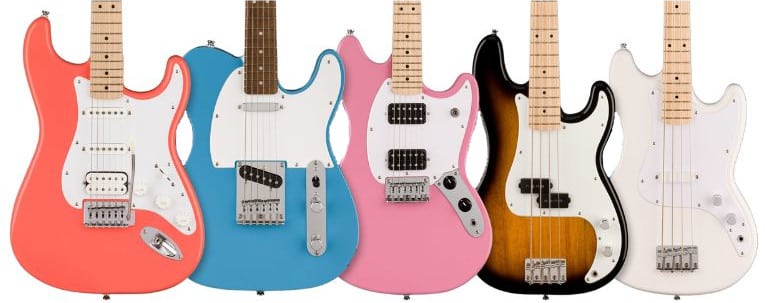
This is a new range of guitars made by Squier with the intention to replace the Bullet series. The concept is to make them lighter and even thinner, with the hopes that they will better fit children.
And while the changes are not radically different from the Bullet series, the line will adopt a few new colors and even a new model or two.
Standard Series
The Standard series is a step-up in terms of quality and features. These guitars offer upgraded features like higher-quality pickups, better hardware, and more finish options.
They’re a great choice for intermediate players or beginners who are ready to upgrade from their first guitar.
Contemporary Series
The Contemporary series is all about modern features and playability. These guitars have features like high-output pickups, modern neck profiles, and updated hardware for a more contemporary playing experience.
They’re a great choice for players who want a more modern sound and feel, and are aimed at more advanced and intermediate guitarists.
Paranormal Series
The Paranormal series is where Squier gets a little more experimental. These guitars feature impressive designs and configurations that you won’t find in the other series.
An example of this is the Esquire they brought back with a huge pick guard on a Telecaster body. It only has one pickup and a rotary knob to change the range of tones.
If you’re looking for something a little different, the Paranormal series might be just what you’re looking for. It will certainly have people asking more about what you’re playing!
Related: Squier serial number lookup.
Does Squier use Quality Hardware?
Squier’s guitars aren’t going to be the same as a top-of-the-line Fender or Gibson, where you will find the best hardware available. But they’re not trying to be, either. Here’s what you can expect from the quality of the Squier hardware:
Pickups
The pickups used on the Squier guitars offer great value. They’re not top shelf, but they are quite far from the bottom.
The sound is clear, with good output, and they amplify the nuances of your playing very well. You can expect to find both single coil and humbuckers on the Squier models.
The configuration will depend on the guitar, of course. You can always swap them out for something higher-end, but for most players, the stock pickups have collected very few complaints.
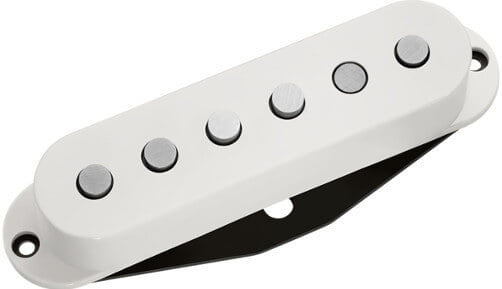
Tuners
The tuners on Squier guitars are reliable. They hold tuning well as they are quite rigid. For an entry-level guitar, the tuners are pretty good.
But you will find that they are not as smooth as more expensive guitars. It might be worthwhile to spend more money on better tuners if you discover that you need to retune your instrument a bit too often.
But most people who are new to the instrument shouldn’t have to worry abut this one bit.
Bridge
There are many different kinds of bridges used on the Squier models. The Stratocasters use a 6-saddle vintage-style bridge. While the Classic Vibe Telecasters have a 3 saddle vintage style bridge.
All the different designs are quite solid and offer good performance. Some players might prefer a higher-end bridge, but for most, the stock bridge will be more than adequate.
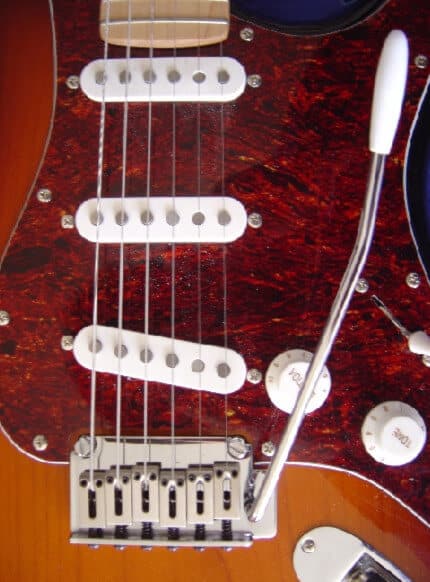
Electronics
The electronics in Squier guitars are actually quite decent. The pots and switches are reliable but can be a bit rough when turned, and the wiring is generally well done.
You’re not going to get the same quality as you would in a high-end guitar, but for the price, the electronics in a Squier are more than satisfactory.
Wood Choices
Depending on the model, a range of various woods are used to make Squier guitars. Alder, basswood, and poplar are used for the bodies, and maple is used for the necks. All of these high-quality woods are frequently used in the production of guitars.
They affect the guitar’s overall tone and feel, and Squier does a wonderful job selecting the ideal wood for each model. And most beginners should be focusing on learning anyway, and not wood types!
Finishes
Guitars made to be this affordable will come with a few imperfections. These are normally seen in the finishes on the body and the neck.
This is because there is only so much time allocated to them as they run along the production line.
Now the finishes are not terrible by any means, but sometimes you might see a small scratch or blemish. But these are not eyesores and will only be seen under certain light conditions. And only a few guitars might have these issues if not caught by their QC.
The Best Squier Guitars for Beginners
Let’s take a look at some of the most popular Squier guitars to find the right one for your style. We will also touch on the features they offer to provide evidence that Squier guitars are excellent for beginners.
Affinity Stratocaster
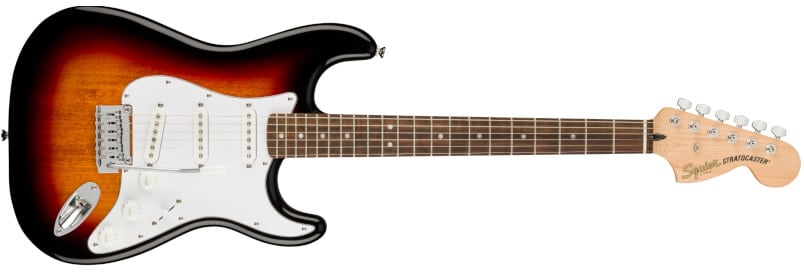
There is no easier way to get into a Stratocaster than this offering from Squier. It’s build really well and sounds very authentic. They are extremely affordable and are of good quality. It features all the same great details as the original Fender’s and will impress any beginner.
The guitar comes with 3 single coil pickups that offer bright Stratocaster tones. They are ceramic no name pickups, but they do sound great. The electronics offer good functionality and help you alter your tone with a knob twist.
Classic Vibe ’50s Telecaster

The Telecaster is a very versatile guitar that can cover many music styles. It has always been a staple guitar in the music world. Now, you can get into a Squier model for much less and still get the same great tone.
This guitar comes with Fender designed Alnico pickups, which offer the same twang you can find in the more expensive versions. The hardware is of pretty good quality and still has the same look.
It has a C-style neck that is comfortable to play and feels just right. Depending on the color and finish you choose, the guitar can easily match your image and look great hanging from your shoulder.
Classic Vibe ’60s Jazzmaster
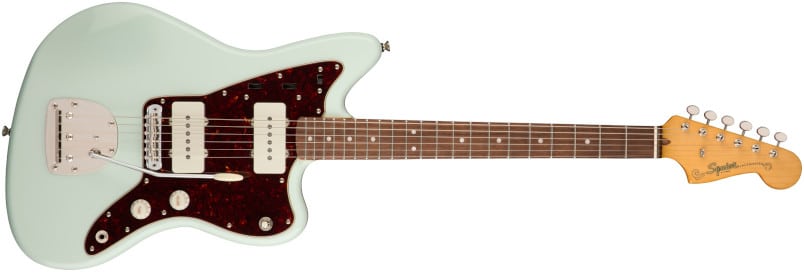
Despite being so affordable, the parts used here are a real bonus! The guitar comes with a real bone nut which is unheard of from this price point! The Jazzmaster also comes with Fender designed alnico pickups for a snappy tone with a wide range.
The nice thing about the Jazzmaster besides the rocking tones is the floating vibrato bridge. It allows you to be super expressive when playing and really create your own sounds.
Then, throw in some highly functional controls and pickup switch, and the sky is the limit when it comes to tone shaping. Just what a Jazzmaster is known to do!
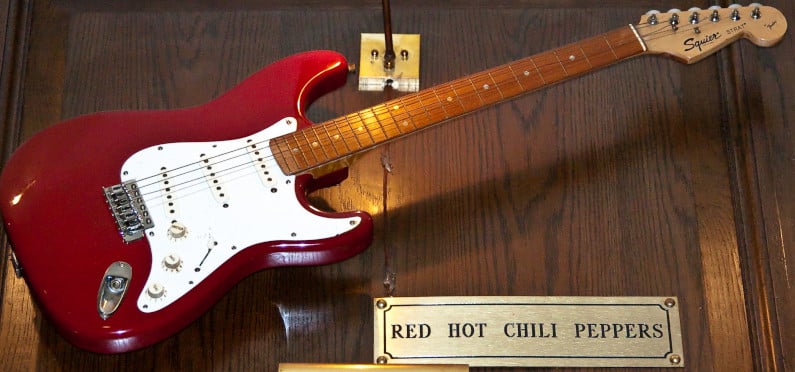
Pros and Cons of Squier Guitars
Pros:
- Affordability: Squier guitars offer a quality instrument at a fraction of the cost of many other brands.
- Versatility: Suitable for a range of musical genres, from rock and punk to blues and jazz.
- Reliability: Many professionals choose Squier guitars as backups due to their consistent performance.
- Variety: Squier offers a wide range of models and series, catering to different musical tastes and preferences.
- Association with Fender: Being owned by Fender ensures that Squier guitars maintain certain standards of quality and craftsmanship.
- Mod-friendly: Squier guitars are known for being easy to customize, allowing players to tweak them to their liking.
Cons:
- Hardware Limitations: While decent for their price, some hardware components (like tuners) might not be as smooth or reliable as those on higher-end guitars.
- Finish Imperfections: Due to their affordability, some models might have minor blemishes or imperfections in the finish.
- Electronics: While satisfactory for most, the electronics might not match the quality found in more expensive guitars.
- Perceived Reputation: Some might overlook Squier due to its reputation as a “beginner’s brand,” even though many of their models are suitable for intermediate and even professional players.
Famous Artists Who Play Squier Guitars
Let’s talk about some of the musicians who’ve chosen to play Squier guitars. You might be surprised to find out that some pretty big names have picked up a Squier at one point or another.
- Avril Lavigne: The pop-punk icon has been seen playing a Squier Telecaster, a versatile instrument that complements her energetic style.
- John Mayer: Known for his bluesy sound and intricate guitar work, Mayer has been spotted with a Squier in hand, proving that these guitars can hold their own even with the pros.
- Simon Neil: The frontman of rock band Biffy Clyro, Neil is a fan of the Squier Jazzmaster, an instrument that fits well with their alternative rock sound.
- Deryck Whibley: The lead vocalist and guitarist of punk rock band Sum 41, Whibley has his own signature Squier Telecaster model, demonstrating the brand’s appeal to punk rock musicians.
- Courtney Love: The lead vocalist and rhythm guitarist for the alternative rock band Hole, Love has been known to play a Squier Venus, a model that was part of Fender’s Vista series in the mid-’90s.
These artists show that Squier guitars are not just for beginners. They’re versatile, reliable, and can be used to create a wide range of music, from pop-punk to blues to alternative rock.
Conclusion
Squier’s guitars stand as a testament to quality craftsmanship at an accessible price point. Their rich history, association with the iconic Fender brand, and the sheer variety of models available make them a compelling choice for all players.
The blend of affordability and performance is a rare find in the musical world, and Squier masterfully bridges this gap. Whether you’re taking your first steps as a guitarist or simply seeking a reliable backup, Squier offers a guitar that resonates with your needs.
So, if you’ve been contemplating adding a Squier to your collection, rest assured, it’s an investment in sound quality and musical heritage.
FAQ
Do Squier guitars come with a case?
Most Squier guitars do not come with a case or gig bag. They’re usually sold separately. However, some retailers may offer bundles that include a case or gig bag.
How long do Squier guitars normally last?
With proper care and maintenance, a Squier guitar can last for many years. The exact lifespan will depend on how the guitar is used and cared for. But many players use their Squier guitars for decades.
What is the most expensive Squier?
The most expensive Squier models are usually part of the Classic Vibe or the Artist series, which includes signature models from various musicians. These guitars often have higher-end features and finishes that make them more expensive than other Squier models.
Are Squier guitars good for professionals?
While Squier guitars are often associated with beginners, they can also be a good choice for professionals, especially as backup instruments or for specific sounds. Many professional musicians have used Squier guitars either in the studio or on stage.
Can you play metal on a Squier guitar?
Yes, you can play metal on a Squier guitar. While the specific sound will depend on the model and the pickups, many Squier guitars are versatile enough to handle a variety of genres, including metal.
And with the right amplifier and maybe a boost pedal, you can get a more aggressive tone by adding a few extra devices to your rig.

